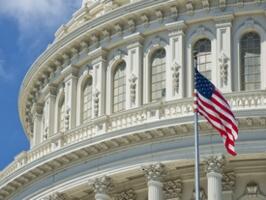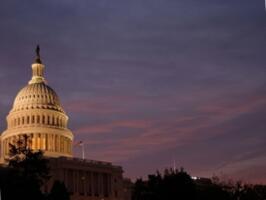Voters Have a State of the Union Message: No New Spending
Voters have a message of their own for President Obama’s State of the Union address tonight: Don’t spend any more money. But fewer than ever plan to follow the speech.
Just 17% of Likely U.S. Voters think the president should focus on new spending programs in his latest State of the Union speech. A new Rasmussen Reports national telephone survey finds that 68% believe the president should focus instead on programs that can be accomplished within current spending levels. Fifteen percent (15%) are undecided. (To see survey question wording, click here.)
The president is expected to call for free community college for millions of Americans, and voters like that idea as long as it doesn’t cost taxpayers anything. Obama is also proposing $320 billion in tax increases on the wealthiest taxpayers to cover the community college plan and other initiatives that he says will benefit lower- and middle-income Americans.
The Republican-dominated Congress is cool to his ideas. But then only 12% of voters think presidents generally accomplish most of what they promise in their State of the Union speeches. Seventy percent (70%) say most of the promises are not fulfilled. Eighteen percent (18%) are not sure.
Just 29% think State of the Union speeches are important in terms of setting the nation's political agenda for the coming year. Sixty-two percent (62%) say they are mostly just for show. Findings for both these questions are unchanged from a year ago.
What has changed is that 64% of voters say they are at least somewhat likely to watch or follow news reports about the president’s latest State of the Union speech. That’s down from 72% last year and a high of 79% in January 2011. The latest finding includes 39% who are Very Likely to watch or follow news reports about the speech. Thirty-three percent (33%) are unlikely to pay attention to the speech, with 16% who say it’s Not At All Likely.
Only 46% are likely to watch or follow news reports about freshman Iowa Senator Joni Ernst’s Republican response to the State of the Union, with 22% who are Very Likely to do so. Fifty percent (50%) are unlikely to follow Ernst’s remarks, including 23% who say it’s Not At All Likely. A high of 62% followed Senator Marco Rubio’s GOP response in January 2013.
(Want a free daily e-mail update? If it's in the news, it's in our polls). Rasmussen Reports updates are also available on Twitter or Facebook.
The survey of 800 Likely Voters was conducted on January 17-18, 2015 by Rasmussen Reports. The margin of sampling error is +/- 3.5 percentage points with a 95% level of confidence. Field work for all Rasmussen Reports surveys is conducted by Pulse Opinion Research, LLC. See methodology.
Most voters have said in surveys for years that they think thoughtful spending cuts should be considered in every program of the federal government, but few think it’s likely that government spending will be significantly reduced over the next few years. In fact, 56% think government spending will go up instead during the president’s last two years in office.
This can be explained in part by partisan differences on the spending issue. Eighty-four percent (84%) of Republicans and 69% of voters not affiliated with either major political party think the president should focus tonight’s speech on programs that can be accomplished within current spending levels. Democrats agree but by a much narrower 52% to 33% margin.
Fifty-one percent (51%) of Democrats prefer a more active government with more services and higher taxes to a smaller one with fewer services and lower taxes. Eighty-three percent (83%) of GOP voters and 57% of unaffiliateds want a smaller government instead.
Seventy-seven percent (77%) of Democrats say they are likely to watch or follow news reports about the president’s speech tonight, with 52% who are Very Likely to do so. Just 30% of Republicans and 33% of unaffiliated voters say they are Very Likely to follow the State of the Union.
Thirty-four percent (34%) of Republicans, on the other hand, are Very Likely to watch or follow news reports about Ernst’s response, compared to 16% of Democrats and 18% of unaffiliated voters.
Fifty percent (50%) of voters in Obama’s party think State of the Union speeches set the political agenda for the coming year. Seventy-four percent (74%) of both Republican and unaffiliated voters say they are mostly just for show.
Voters who want the president to focus on new spending programs are much more likely to be tuning into his speech than those who want him to work within existing spending levels.
The president is expected tonight to continue the emphasis on income inequality that he began in his speech a year ago. Seventy-three percent (73%) of voters rate income inequality as a serious problem in this country, with 43% who say it’s a Very Serious one. But 55% believe less government rather than more government involvement in the economy is the better way to close the income gap.
Taxes and spending top the new Congress' to-do list as far as voters are concerned, and 61% think the main thing the government should do to help the economy is cut spending.
Voters are evenly divided when asked whether the president or Congress should take the lead on issues important to the nation. However, most voters still believe the federal government should only do what the president and Congress agree on.
Additional information from this survey and a full demographic breakdown are available to Platinum Members only.
Please sign up for the Rasmussen Reports daily e-mail update (it’s free) or follow us on Twitter or Facebook. Let us keep you up to date with the latest public opinion news.
The survey of 800 Likely Voters was conducted on January 17-18, 2015 by Rasmussen Reports. The margin of sampling error is +/- 3.5 percentage points with a 95% level of confidence. Field work for all Rasmussen Reports surveys is conducted by Pulse Opinion Research, LLC. See methodology.
Rasmussen Reports is a media company specializing in the collection, publication and distribution of public opinion information.
We conduct public opinion polls on a variety of topics to inform our audience on events in the news and other topics of interest. To ensure editorial control and independence, we pay for the polls ourselves and generate revenue through the sale of subscriptions, sponsorships, and advertising. Nightly polling on politics, business and lifestyle topics provides the content to update the Rasmussen Reports web site many times each day. If it's in the news, it's in our polls. Additionally, the data drives a daily update newsletter and various media outlets across the country.
Some information, including the Rasmussen Reports daily Presidential Tracking Poll and commentaries are available for free to the general public. Subscriptions are available for $4.95 a month or 34.95 a year that provide subscribers with exclusive access to more than 20 stories per week on upcoming elections, consumer confidence, and issues that affect us all. For those who are really into the numbers, Platinum Members can review demographic crosstabs and a full history of our data.
To learn more about our methodology, click here.





